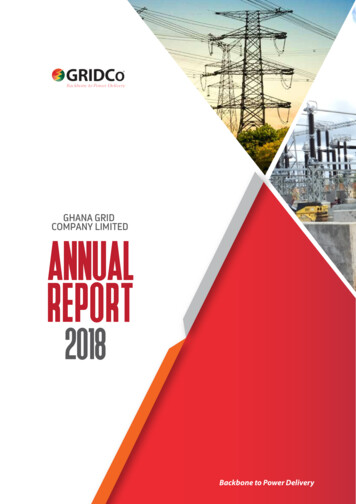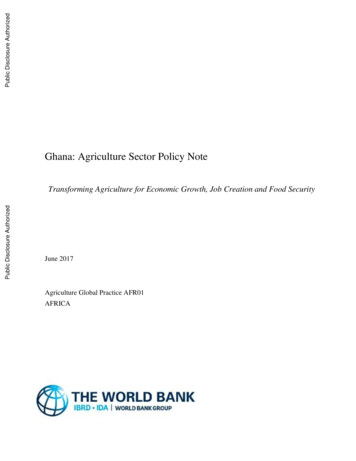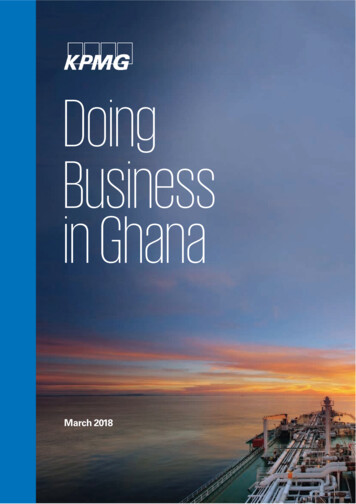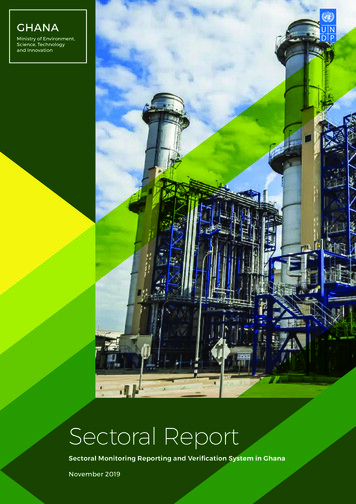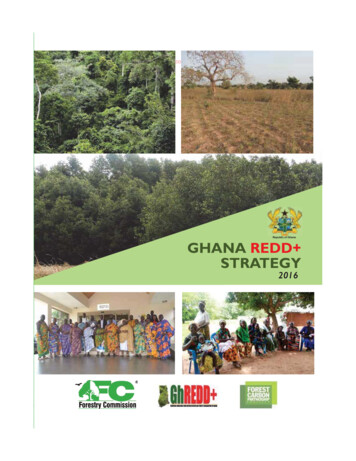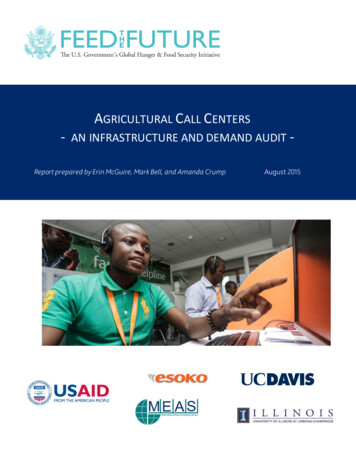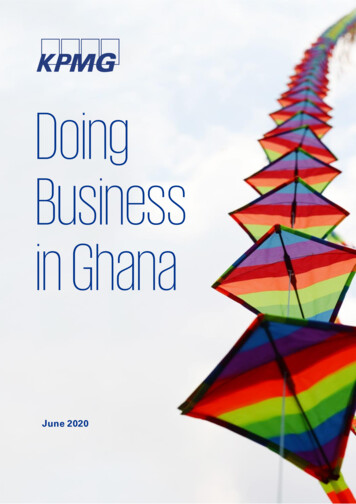
Transcription
DoingBusinessin GhanaJune 2020
Table ofContentsAbout Ghana003306Modern Ghana takes its namefrom the ancient kingdom ofGhana which was situated some800 km.Legal FrameworkThe government is committed toimplementing policies that reducethe general cost of doing businessin GhanaTax System1117The tax types that investors willencounter in Ghana areCorporate Tax and endix BGhana TaxData Cards KPMG 2020. A partnership established under Ghanaian law and a member firm of the KPMG network of independentmember firms affiliated with KPMG International Cooperative (“KPMG International”), a Swiss entity. All rights reserved.2
AboutGhana
Ghana lies at the heart of aregion which has been leadingSub-Saharan African culture sincethe first millennium BC in metalworking mining, sculpture andagriculture. In 1951, the GoldCoast became the first Britishcolony in Africa to achieve selfgovernment and upon attainingpolitical independence in 1957, itbecame known as Ghana.LocationModern Ghana takes its name from the ancient kingdom ofGhana which was situated some 800 km. (500 miles) to thenorth of present-day Accra, which flourished up to the eleventhcentury AD. Ghana lies on Latitude 5 degrees, 36 minutesnorth and Longitude 0 degrees, 10 minutes east. To the westof Ghana lies Côte d’Ivoire, to the east Togo, to the north,Burkina Faso and to the south is the Gulf of Guinea. TheGreenwich Meridian passes through Tema near Accra, makingGhana geographically the closest to the centre of the world,that is, the notional point of intersection between the equatorand longitude zero degree (0 degree) which is in the AtlanticOcean at about 614km from Accra.ClimateThe climate is mainly tropical. There are two mainseasons; the wet and the dry seasons. Northern Ghanaexperiences its rainy season from March to Novemberwhile the south, including the capital Accra,experiences that season from April to mid- November.VegetationGhana has tropical vegetation of dense tropical rain forestin the southern middle belt. The vegetation cover isevergreen forest with semi deciduous forest at thenorthern and southern fringes. Towards the north issavannah grassland and towards the coast is the coastalsavannah.There are a few mountains and several hills rising to aheight of 900 meters and above. Mount Afadzato is thehighest mountain and lies 1,500 meters above sea level.DrainageThe Volta Lake formed after damming the river isnavigable for a distance of about 400 km andmotorised vessels now ply its waters carryingpassengers and goods from the south of the countryto the north and vice versa. There are several riversin the country and the most important is the Voltadammed at Akosombo, Akuse and Bui (situated onthe Black Volta) for hydro- electric power generationplants.Other rivers are the Pra, Ankobra and Tano. Among thesmaller rivers are the Densu and Ayensu which provideWinneba and parts of the capital, Accra, with pipeborne water. The largest natural lake in the country isBosomtwi with a total area of 48 square kilometres andreaches depths of 72 meters in some parts.PopulationAs of 1 January 2020, the population of Ghana was estimated tobe 30,496,507 people. This is an increase of 2.39 % (712,144people) compared to population of 29,784,363 the year before.In 2019 the natural increase was positive, as the number ofbirths exceeded the number of deaths by 723,760. Due toexternal migration, the population declined by 11,616. The sexratio of the total population was 1.040 (1,040 males per 1,000females) which is higher than global sex ratio. The global sexratio in the world was approximately 1,016 males to 1,000females as of 2019.Below are the key figures for Ghana population in 2019:996,585 live births272,825 deathsNatural increase: 723,760 peopleNet migration: -11,616 people15,547,239 males as of 31 December 201914,949,268 females as of 31 December 2019Ethnic GroupsGhana is home to more than 100 different ethnic groups. Theofficial language is English; however, most Ghanaians also speakat least one local language.The ethnic groups in Ghana are the Akan (the Fante, Akyem,Ashanti, Kwahu, Akuapem, Nzema, Bono, Akwamu, Ahanta andothers) 47.3 %; Mole-Dagbani 16.6%; Ewe 13.9 %; Ga-Dangme (Ga, Dangme) 7.4%;Guan 3.7%; Gurma 3.7%; Grusi 2.5%;Mande 1.1%; other tribes 1.4%; other (Hausa, Zabarema, Fulani)0.4% (2010 census).The religious distribution of the country is as follows: Christianity71.2% (Pentecostal/Charismatic 28.3%, Protestant 18.4%,Catholic 13.1%, other 14%), Islam 17.6%, Traditionalist 5.2%,and noaffiliation 5.3%, none 0.7% (2010 census).The country is drained by a large number of streams andrivers. The Volta River and its tributaries drain more than twothirds of water bodies in the country. All the major rivers inthe country flow into the Gulf of Guinea directly or astributaries to other major rivers. The Akosombo and BuiDams, both built on the Volta River,provideshydro-electricity for Ghana. KPMG 2020. A partnership established under Ghanaian law and a member firm of the KPMG network of independentmember firms affiliated with KPMG International Cooperative (“KPMG International”), a Swiss entity. All rights reserved.4
EducationJudiciaryMost Ghanaians have relatively easy access to primary andsecondary education. The introduction of Free secondary inSeptember 2017 led to a significant increase intake of thenumber of students to senior high schools across thecountry. The policy resulted massive infrastructuredevelopment to house the increase number in some seniorhigh schools.Under the educational reforms implemented in 1987, thebasic education system of Ghana comprises a six-yearprimary education system which usually begins at the ageof six and a three-year junior high school education system.At the end of the third year of the junior high school,students sit for the Basic Education Certificate Examination(BECE) organised by the West African Examinations Council(WAEC). Thereafter, there is a continuation of a three-yearsenior high school for successful student. Those continuingmust complete the three-year senior high school (SHS) ortechnical/vocational programme by sitting the relevantqualification examinations. Successful students cancontinue to the tertiary institutions, either to theuniversities, polytechnics, nursing training colleges or theteacher colleges of education.Government in its 2020 Budget Statement and EconomicPolicy projected that 1.2 million Ghanaian students areexpected the have access to secondary education by 2020,justifying its spending of Gh 2.2billion on education.Government intimated that; it was gratifying to note thatthe first cohort of students under the programmenumbering about 362,000 were due to graduate in 2020.GovernmentThe system of government practised in Ghana is Parliamentarydemocracy with separation of powers among the Executive,the Legislature and the Judiciary guaranteed under the 1992Constitution. The press enjoys a great deal of freedom whichhas been nurtured into one of the most vibrant in Africa.The 1992 Constitution provides checks and balances whichlimit the powers of each of the arms of government.The Constitution also provides for a Council of State, made upof experienced elders with proven character, to advise thePresident on national issues. The Constitution has alsoestablished several autonomous institutions such as theCommission for Human Rights and Administrative Justice(CHRAJ), the Electoral Commission (EC) and Economic andOrganised Crime Office (EOCO). These institutions are there tofacilitate good governance and transparency. The Governmentis elected by universal adult suffrage. There have been sixdemocratically elected presidents and parliaments since 1992The legal system is based on the English common law andcustomary laws of Ghana. The court system is made up of theSupreme Court of Ghana, Court of Appeal and the High Courtof Justice which constitute the superior courts. Below theseare the Magistrate, Circuit and District Courts, and familytribunals which constitute the lower courts. The traditionalrulers also settle disputes among their subjects, but suchdecisions do not constitute judgment of a court of competentjurisdiction. The 1992 Constitution which is the basic law of theland guarantees an independent judiciary.Membership withotherorganisationsGhana is a member of many international organisationsincluding the United National, International Monetary Fund,World Trade Organisation, South Atlantic Peace CooperationZone, the Commonwealth of Nations, the EconomicCommunity of West African States, the African Union, theAfrican Continental Free Trade Area, the United Nations, theNon-Aligned Movement, and an Associate Member of LaFrancophone. Ghana is an observer to the organisation ofAmerican States and has a strong record of contributing troopsto international peace keeping forces.EconomyGhana’s overall GDP growth rate target for 2020 of 6.8%represents a 60-basis point increase over that of the 2019(based on the revised budget). Growth in GDP is projected tosee a fall between 2021 and 2022 due to a significant drop inindustry sector growth expectations. Growth performance ishowever expected to accelerate in 2023.Over the medium term, the growth of the industry sector isexpected to average 5.2% and will peak at 8.6% in 2020. Asharp decline in growth is expected in the sector in in 2021 and2022 largely due to a fall in crude oil production from existingfields. The sector’s growth will, however, improve in 2023,driven by expected production from the Pecan FieldThe services sector is expected to attain an average growth of6.3%, the highest average growth of the three sectors over themedium term. The growth of the services sector is expected totrend upwards from 5.8% in 2020 till it reaches 6.9% in 2023.Accounting for this trend is the anticipated growth of the healthand social work sub-sectors which are projected to grow by20.15%, on the average, over the medium term.The agriculture sector is expected to grow at an average rate of5.4% over the medium term.The macroeconomic targets for 2020 and those to be pursuedover the medium term (i.e. 2020 –2023) remain anchored by theCoordinated Programme of Economic and Social DevelopmentProgrammes (CPESDP) and the Medium-Term NationalDevelopment Policy. KPMG 2020. A partnership established under Ghanaian law and a member firm of the KPMG network of independentmember firms affiliated with KPMG International Cooperative (“KPMG International”), a Swiss entity. All rights reserved.5
InvestmentandLegalFramework
Investment and Legal FrameworkWhy Do Business in Ghana?The government is committed to implementing policies thatreduce the general cost of doing business in Ghana and topromote investor confidence in the country. With a stablemulti-party government that is committed to marketliberalisation, Ghana has been ranked as one of the mostattractive locations for doing business in Africa. Other factorsthat make Ghana a competitive investment destinationinclude: A sound macroeconomic environmentImmediate access to all markets of the EconomicCommunity of West African States (ECOWAS)100% foreign ownership is permittedOn-going privatisation in key economic sectorsOn-going infrastructure developmentExpanding stock marketCompetitive labour forceAvailability of skilled and trainable labourQuota-Free access to USA & European Unionmarkets.Export-free zones where goods traded with othercountries are exempt from customs duties andsome lawsFast developing financial infrastructureHigh degree of personal safety andWarm and friendly peopleStarting a Business in GhanaProcess, Time and CostDomestic LawsLaws governing the establishment of business in Ghanaare provided in the following legislations: The Companies Code, 1963 (Act 179)The Incorporated Private Partnership Act, 1962(Act 152)The Business Name Act, 1962 (Act 151)The investor, whether Ghanaian or a foreigner, who desires toestablish a resident business entity has to register with theRegistrar of Companies. This registration may be done underone of the laws mentioned above, except where the entity isto operate in the Country as a representative of a non-residentbusiness entity. Non-resident business entities do not gothrough the process of incorporation under Act 992, butsimply submits the required documents to the Registrar ofCompanies for registration as an external company.Investment LegislationThe legal framework for investment in Ghana isregulated by different agencies in the country.These are: Registrar General’s DepartmentGhana Investment Promotion Centre (GIPC)Ghana Immigration Service (GIS)Ghana RevenueAuthority (GRA)Environmental Protection Agency(EPA)Ghana Free ZonesBoardPetroleumCommissionMinerals Commission.Investment ProceduresThe first step for an investor wishing to invest in Ghana is toregister with the Registrar of Companies. The departmentcharges a nominal administrative fee, plus capital duty of0.5% of the company’s stated capital. The official processingtime varies between one to two weeks, after which thecompany will receive the certificate of incorporation.After incorporation, companies that are partly or fully ownedby foreigners have to register with the GIPC. Registration iscompleted after companies have met the minimum equityrequirements depending on their structure as shown below.The required equity can be brought into Ghana either inmoney or in kind (goods, plant and machinery, vehicles orother tangible assets). Money can be brought in cash, subjectto some prescribed maximum limit existing at the time ortransferred into the account of the incorporated company at aGhanaian commercial bank. The bank must confirm thetransfer to the Bank of Ghana, which subsequently informsthe GIPC. Equity in kind should be generally supported byrelevant documents such as bills of lading, invoices andothers and are generally confirmed by the Customs Divisionof Ghana Revenue Authority prior to being presented to theGhana Investment Promotion Centre.Registrar General’s DepartmentThe Registrar General’s Department is the organisation thatregisters all companies, societies and institutions in Ghanaand issues certificates of incorporation to newly formedcompanies.For more information please see attachedAppendix A (Registration of Business). KPMG 2020. A partnership established under Ghanaian law and a member firm of the KPMG network of independentmember firms affiliated with KPMG International Cooperative (“KPMG International”), a Swiss entity. All rights reserved.7
Investment and Legal FrameworkGhana Investment PromotionCentre (GIPC)The Ghana Investment Promotion Centre was set up to initiateand maintain a favourable environment for both Ghanaian andforeign investments in Ghana. The GIPC was establishedunder the GIPC Act as the government agency responsible foroverseeing investments in all sectors of the economy exceptmining, petroleum,free zones and portfolio investments. Investments in themining and petroleum sectors are licensed by the MineralsCommission and the Petroleum Commission respectively,while that for Export Processing and portfolio investments areadministered by the Ghana Free Zones Board and Ghana StockExchange.Ghana ImmigrationServiceGhana Immigration Service is the governmental authority thatgrants work and/or residence permits. It also handles re-entryvisas, extension of visitors permits and visa on arrival tovisitors in Ghana where there is no Ghanaian Embassy orconsulate abroad.Ghana RevenueAuthority (GRA)The Ghana Revenue Authority is the Government agencyresponsible for administering all the tax laws in Ghana.Hitherto, revenue collection in the Country was done underthe Internal Revenue Service (IRS), Value Added TaxService (VATS) and the Customs Excise and PreventiveService (CEPS). These agencies operated as autonomousbodies with a Revenue Agency Governing Board playingmonitoring and supervisory roles. Currently, all the aboveagencies have been merged into one body called the GhanaRevenue Authority (GRA). The Ghana Revenue Authorityhas three divisions, namely, Domestic Tax RevenueDivision, Customs Division, and the Support ServicesDivision.Environmental ProtectionAgency (EPA)The Environmental Protection Agency is the body responsiblefor issuing environmental permits to companies operating invarious fields. The investor will often be required to submit anenvironmental impact assessment report to obtain anenvironmental permitFree Zones BoardThe Ghana Investment Promotion Centre keeps track of allinvestments in the Country while the Ghana Free ZonesBoard regulates enterprises that operate in the Free Zoneenclaves. These enterprises are required to export at least 70percent of their products and should be registered as freezone enterprises.Any investor who will be producing to export at least 70percent of its total output can take advantage of the FreeZones Act and locate their businesses within the Free ZoneEnclaves at Tema or Sekondi. Boankra in the Ashanti Regionis being developed as a third Free Zone Enclave. Registrationas an entity operating in the Free Zone Enclave generallyhappens after going through the business registrationprocesses described above and having the relevantapplications to be a free zone enterprise approved by theFree Zones Board.Some of the privileges available to Free Zone Enterprises arethe exemption from tax on imports into the Free Zone aswell as exemptions from duty and other taxes on exports toforeign countries. Free Zone Enterprises are exempt fromcorporate income tax for a period of ten (10) years, andthereafter, the corporate tax shall be 15 percent and 25percent on income from sales to foreign markets (export) andthe local market respectively.Depending on the industry or sector, additional registrationmay be necessary with other regulatory bodies such as:The Customs Division is responsible for collecting customsand excise duties whereas the Domestic Tax RevenueDivision takes care of Income Tax, Value Added Tax, andGhana Education Trust Fund & National Health Insurancelevies. The Support Services Division is responsible for allinternal functions such as finance and administration, legal,human resource, etc. of the Authority. Each of the threedivisions is headed by a Commissioner who reports to theCommissioner- General.This is a body set up under the Petroleum Commission Act,2011 (Act 821), to regulate and manage the utilisation ofupstream petroleum resources and to co-ordinate policiesin relation to them.Any investor in Ghana will necessarily have to register atone of the GRA offices to pay one tax type or another.The Petroleum Commission has the followingresponsibilities, among others:Petroleum Commission Recommending to the Minister responsible forpetroleum national policies relating to petroleumactivitiesMonitoring petroleum activities and carryingout relevant inspections and audits related tosuch activities KPMG 2020. A partnership established under Ghanaian law and a member firm of the KPMG network of independentmember firms affiliated with KPMG International Cooperative (“KPMG International”), a Swiss entity. All rights reserved.8
Investment and Legal Framework Receiving applications and issuing permits forspecific petroleum activities as required underrelevant petroleum laws and regulationsPromoting local content and local participation inpetroleum activities as prescribed in theLegislative Instrument (L.I 2204) and otherapplicable laws and regulations to strengthennational development, etc.Ghana National PetroleumCorporation (GNPC)The Ghana National Petroleum Corporation was establishedby the Ghana National Petroleum Corporation Act, 1983(PNDCL 64).MandateGNPC was established as a state-owned entity and givenlegal backing “to undertake the exploration, development,production and disposal of petroleum”. The PNDCL 84establishes the legal framework governing the contractualrelationship between the state, GNPC and prospectiveinvestors in upstream petroleum operations.The Corporation was established with the followingobjects: To accelerate the promotion of petroleumexploration activities to ensure early commercialdiscovery and productionTo undertake the appraisal of existing petroleumdiscoveries to ensure production to meet nationalrequirementsTo ensure that Ghana obtains the greatest possiblebenefits from the development of its petroleumresourcesTo obtain the effective transfer to Ghana ofappropriate technology relating to petroleumoperationsTo ensure the training of citizens of Ghana and thedevelopment of national capabilities in all aspects ofpetroleum operations, andTo ensure that petroleum operations are conductedin such a manner as to prevent adverse effects onthe environment, resources and people ofGhana.Minerals CommissionThis is a Government agency established under Article 269 ofthe 1992 Constitution and the Minerals Commission Act, 1993(Act 450) as the main promotional and regulatory body for theminerals sector. The Commission is responsible for regulatingand managing the utilisation of the mineral resources in theCountry and implementing policies relating to mining. It alsohas responsibility for ensuring compliance with the variousminerals and mining laws.Investors seeking to invest in the minerals sector have toregister with the Minerals Commission after completing thenecessary registration or incorporation requirements at theoffice of the Registrar of Companies.National PetroleumAuthorityThe National Petroleum Authority is responsible forregulating the downstream petroleum industry in Ghana. Asa Regulator, the Authority ensures that the industry remainsefficient, profitable, fair, and at the same time, ensuring thatconsumers receive value for money.Downstream activities include importation and refining ofcrude oil, sale, marketing and distribution of refinedpetroleum products in the country, exportation, reexportation, shipment, transportation, processing, refining,storage, distribution, marketing and sale of petroleumproducts.Its responsibilities include issuing licenses to PetroleumServices Providers (PSPs), monitoring of the operations ofPSPs and inspecting facilities of PSPs in the downstreamindustry.The NPA also ensures the quality design, construction andoperation of all petroleum infrastructure and that consumersreceive high quality fuel that is safe, efficient and value formoney.Other responsibilities include ensuring adequatemaintenance of petroleum and fair pricing of products.For more information on the NPA and licensing fees visittheir website at www.npa.gov.gh/With the establishment of the Petroleum Commission,GNPC ceased to exercise the advisory functions relating tothe regulation, management and utilisation of petroleumresources and the coordination of policy in relation to thatfunction. KPMG 2020. A partnership established under Ghanaian law and a member firm of the KPMG network of independentmember firms affiliated with KPMG International Cooperative (“KPMG International”), a Swiss entity. All rights reserved.9
ExpatriatesForeign investors are given automatic immigrant quotasdepending on the level of equity capital invested in thebusiness in Ghana.However, there are opportunities to apply for increases inautomatic quota depending on the circumstances and needsof the business. After registration with the GIPC, companiescan apply for immigrant quotas.The table below shows the automatic expatriate quotaobtainable based on the amount of capital contributed by theforeigner to the business in Ghana:Paid Up Capital and Related Quota of Expatriate StaffPaid Up Capital Required (US )Quota of ExpatriateStaff50,000 - 250,0001250,000 -500,0002500,000 - 700,0003700,000 4Investment Incentives and GuaranteesInvestment incentives are used by the Government to attractinvestors to sectors of the economy that require stimulationfor grow. Some geographical areas of the Country are alsotargeted for investments to generate employment. Suchincentives are found in various legislations such as the GIPCAct, Free Zones Act, and the Petroleum and Mining Laws.Investment incentives can also be found in the mainrevenue/tax laws.The GIPC Act protects the businesses of investors fromnationalisation or appropriation by any Government. Wheresuch a step has to be taken, it can only be done by law andshould be in the national interest. In such a case, adequatecompensation will be paid. No individual can also becompelled to cede his interest in any investment to any otherperson.Transfer of profits, interests or dividends accruing from theseinvestments are also guaranteed by the GIPC Act. KPMG 2020. A partnership established under Ghanaian law and a member firm of the KPMG network of independentmember firms affiliated with KPMG International Cooperative (“KPMG International”), a Swiss entity. All rights reserved.10
TaxSystem
Tax SystemEquipment for agriculture and fishingHousing (ownership and rental). However, houses soldby real estate companies, and rental of properties forcommercial purposes are taxableDomestic transportation of passengers by road, rail andwater.Ghana RevenueAuthority The tax types that investors will encounter in Ghana areCorporate Tax, Withholding Tax, Value Added Tax, NationalHealth Insurance Levy, Ghana Education Trust Fund Levy,Employment Tax, Dividend Tax, Customs and Excise Duties andCommunication Service Tax. CorporateTaxCustoms DutyThe general corporate income tax is twenty-five percent (25%).Companies in the mining and petroleum sectors have acorporate tax rate of thirty-five percent (35%). Also, entities intheir temporary concessionary period as specified under IncomeTax Act, 2015 (Act 896) are subject to corporate income tax at arate of one percent except Free Zone enterprises who areexempt from tax during that period but subject to corporateincome tax of fifteen percent on its exports after theconcessionary period and twenty-five percent(25%) where salesare made to the domestic market.Agricultural and industrial plant, machinery and equipmentimported for investment purposes are exempted from customsimport duty. All import duty- exempted goods, however, attractprocessing and/or other related fees or levies ranging between0.5% and 2.0%, except for goods imported specifically for theeducational, health and agricultural sectors.The entities in the hospitality industry on the other hand paycorporate income tax at a rate of twenty- two percent (22%).Income tax incentives are provided under Act 896. Dependingon the sector and location in which an entity operates, it may beliable to pay tax at rates different from the general corporate taxrate.Withholding taxAll companies are generally obliged to withhold tax frompayments made to persons for the supply of goods, works orservices. The withholding tax does not apply in cases where thevalue of the contract does not exceed GH 2,000 for a year ofassessment.The rate varies from three percent (3%) to twenty percent (20%)depending on whether the person is resident or a non-resident,and on the type of transaction.The Double Taxation Agreement (DTA) where applicable to atransaction may provide a lower withholding rate.ValueAdded tax (VAT) /NationalHealth Insurance Levy (NHIL)A VAT rate of 12.5%, and NHIL and GETFL rate of 2.5 % eachare chargeable on the supply of goods and services made inGhana, the importation of goods into Ghana and the supply ofimported services. There is also a 3% Flat Rate Scheme whichis charged by retailers and wholesalers.Commercial buses with seating capacity of above thirtypassengers, workshop vans, breakdown vehicles, mobileshowrooms, ambulances, hearse and motor bikes are alsoexempted from the payment of import duty.However, certain types of vehicles attract both import duty andValue Added Tax (VAT), National Health & Insurance Levy (NHIL)and Ghana Education Trust Fund Levy (GETFL). Import dutiesrange between 0% and 20%.DomesticTaxTaxation of IndividualsResident individuals pay tax on their income at graduated rateswith thirty percent (30%) being the highest marginal rate.Sole Proprietorships and partners of partnerships also pay tax atthe graduated rates up to an upper limit of thirty percent (30%).Individuals enjoy tax reliefs such as marriage or responsibilityrelief, child education relief, old age relief, aged dependent relief,training and development relief, and disabled relief. Individualswho have life insurance policies get reliefs for the premiums paidfor the policies. Those who pay the mandatory and voluntarypension contributions (Tiers 1, 2 and 3) get reliefs for amountscontributed. Employers also get relief for additional contributionsthey make on behalf of their employees. The total amount ofpension contribution to be allowed tax deductibility should notexceed thirty-five percent of the individual’s base pay.An individual is considered resident in Ghana where she/he ispresent in Ghana for at least 183 days in any 12month period thatcommences or ends during the year of assessment.The income tax rate for a non-resident individual is 25% flat on theincome accrued or derived in Ghana.Persons dealing in taxable supplies must register with theDomestic Tax Revenue Division of the Ghana Revenue Authorityin order to charge the tax. Registered taxable persons areobliged to file a tax return and pay VAT, NHIL & GETFL everymonth.Goods and services exempted from VAT/NHIL are: Food produced in Ghana and sold in its raw statePetrol, diesel and kerosene KPMG 2020. A partnership established under Ghanaian law and a member firm of the KPMG network of independentmember firms affiliated with KPMG International Cooperative (“KPMG International”), a Swiss entity. All rights reserved.12
Corporate TaxResident companies in Ghana pay corporate tax at 25% on theirtaxable profits. By the Income Tax Act, 2015 (Act 896), acompany is considered a resident company in Ghana for a yearof assessmen
the first millennium BC in metal-working mining, sculpture and agriculture. In 1951, the Gold Coast became the first British colony in Africa to achieve self- . which flourished up to the eleventh century AD. Ghana lies on Latitude 5 degrees, 36 minutes north and Longitude 0 degrees, 10 minutes east. To the west
